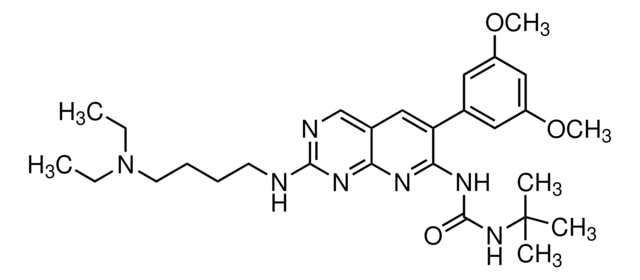PZ0162
PD 0325901
≥98% (HPLC)
Synonym(s):
N-[(2R)-2,3-Dihydroxypropoxy]-3,4-difluoro-2-[(2-fluoro-4-iodophenyl)amino]-benzamide
About This Item
Recommended Products
Quality Level
Assay
≥98% (HPLC)
form
powder
optical activity
[α]/D -1.8 to -3.5°, c = 1 mg/mL in methanol
color
white to off-white
solubility
DMSO: 20 mg/mL, clear
storage temp.
2-8°C
SMILES string
FC1=C(NC2=CC=C(I)C=C2F)C(C(NOC[C@H](O)CO)=O)=CC=C1F
InChI
1S/C16H14F3IN2O4/c17-11-3-2-10(16(25)22-26-7-9(24)6-23)15(14(11)19)21-13-4-1-8(20)5-12(13)18/h1-5,9,21,23-24H,6-7H2,(H,22,25)/t9-/m1/s1
InChI key
SUDAHWBOROXANE-SECBINFHSA-N
Gene Information
human ... MAP2K1(5604) , MAP2K2(5605)
Application
Biochem/physiol Actions
Features and Benefits
Signal Word
Danger
Hazard Statements
Precautionary Statements
Hazard Classifications
Acute Tox. 3 Oral - Aquatic Chronic 4 - STOT RE 2
Storage Class Code
6.1C - Combustible acute toxic Cat.3 / toxic compounds or compounds which causing chronic effects
WGK
WGK 3
Flash Point(F)
Not applicable
Flash Point(C)
Not applicable
Certificates of Analysis (COA)
Search for Certificates of Analysis (COA) by entering the products Lot/Batch Number. Lot and Batch Numbers can be found on a product’s label following the words ‘Lot’ or ‘Batch’.
Already Own This Product?
Find documentation for the products that you have recently purchased in the Document Library.
Customers Also Viewed
Articles
The extracellular signal regulated kinase (ERK1 and ERK2) pathways are activated by mitogens and play an important role in controlling cell growth and differentiation.
The extracellular signal regulated kinase (ERK1 and ERK2) pathways are activated by mitogens and play an important role in controlling cell growth and differentiation.
The extracellular signal regulated kinase (ERK1 and ERK2) pathways are activated by mitogens and play an important role in controlling cell growth and differentiation.
The extracellular signal regulated kinase (ERK1 and ERK2) pathways are activated by mitogens and play an important role in controlling cell growth and differentiation.
Our team of scientists has experience in all areas of research including Life Science, Material Science, Chemical Synthesis, Chromatography, Analytical and many others.
Contact Technical Service
















